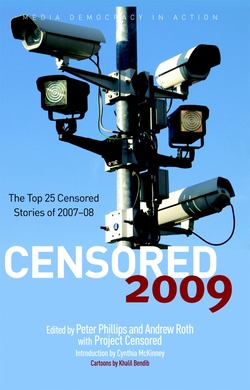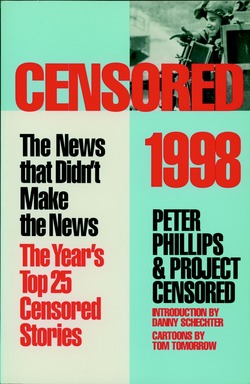Edited by Mickey Huff, Andy Lee Roth, and Project Censored
Illustrated by Khalil Bendib
The annual yearbook from Project Censored features the year's most underreported news stories, striving to unmask censorship, self-censorship, and propaganda in corporate-controlled media outlets. Featuring the top twenty-five most underreported stories, as voted by scholars, journalists, and activists across the country and around the world, as well as chapters exploring timely issues from the previous year with more in-depth analysis.
Hey, it’s Banned Books Week. To celebrate, Seven Stories is releasing two of our most hotly anticipated titles of the year—Kurt Vonnegut’s Complete Stories and Khary Lazarre-White’s novel Passage. Both men write about excruciatingly painful things in ways that are sometimes alarming and somehow always ultimately satisfying. I’m sorry Kurt isn’t here to meet Khary. I know he would have understood right away that he represents a new kind of political and literary voice.
Passage brings you inside the mind and heart of a seventeen-year-old kid who happens to be black living in New York. The reader gets to walk in his shoes, and that’s not a comfortable proposition. Khary Lazarre-White sets the book in 1993, a quarter-century ago, partly because he himself was a seventeen-year-old kid who happened to be black living in New York at that time—so while Passage is purely a work of the imagination, it is also a book where everything in it down to the last detail is real and true and how it was—and partly to remind us how little things have improved for black youth in these last twenty-five years. In its advance review, Booklist calls Passage “a unique and haunting portrayal of a young black man considering his inheritance, and his destiny.” I hope you’ll have a chance to catch Khary at one of his dozen-plus events across the country in October and November.
In my thirty-plus years as a book publisher, I haven’t seen a cultural climate as narrow as now. Even as we celebrate diverse voices, they are fewer and farther between. Just when we need open minds, people are being persuaded to close their minds down—and never forget that the defining aspect of narrow-mindedness is thinking you aren’t narrow-minded at all! There is much to be encouraged by—including a resurgent independent publishing community, and hundreds of new independent bookstores across America. The curious and independent and open-minded are out in force, thankfully. But it isn’t as if we’re winning the war.
It’s funny but I’m sure there are two reasons we associate Kurt Vonnegut with Banned Books Week. One is that his books were and keep being banned. Slaughterhouse Five is very high on the list of most-banned books of all time. That’s of course the first reason, but the other is that whole idea of book banning and hence of something called Banned Books Week is just the kind of absurd theatre that belongs in a book by Kurt Vonnegut.
This year is the tenth anniversary of the Kurt’s death, which means that those of us who knew him well and loved him are starting to feel our close memories of him change and shift, because even memories have to change and shift like the oceans if they are going to stay vibrant and muscular and alive.
When I first met Kurt some thirty-three years or so ago, it was Nelson Algrenwho brought us together. Algren had died three years earlier, so strictly speaking it was Algren’s ghost, and his books of course, that first bonded us, and a very good and sturdy bridge-builder Algren’s ghost was. I didn’t understand it at first, but Kurt cared about what I was doing from the very beginning because I was bringing back into print all the books of his friend Nelson who had died recently. So I was Kurt’s friend long before I knew I was. I mean, for ten years I called him Mr. Vonnegut, while he called me Dan and sent me notes and left messages on my phone making sure things were all right with me and with Seven Stories. I finally figured out that he had always welcomed me as a friend, but it took me those ten years to realize it.
If you read some of the things Kurt wrote in response each time his books were banned, you can see how much he was hurt by it. In one case, after a school board in Drake, North Dakota, had its copies of Slaughterhouse Five burned in the school furnace along with other incendiary volumes, Kurt wrote an anguished letter to them saying among other things that they had the only copy and so if they wished to consign his letter too to the flames of the furnace they could do so knowing that then these words would be gone from the face of the earth forever. I think it was because Kurt believed so fervently in the redemptive power of literature and in the human ability to draw inspiration and solace from books that he could be so hurt whenever his books were banned. Almost as if he were saying, “No, no, no, this is all a misunderstanding. My books are good for people.” And indeed they are.
Complete Stories is a once-in-a-lifetime kind of book. No one has ever attempted to wrestle with and make sense of Kurt’s entire short-story output—nearly 1,000 pages. Birthing Complete Stories required enormous energy and commitment from its two indefatigable editors Dan Wakefield and Jerry Klinkowitz, as well as a supporting cast that included everyone at Seven Stories, a number of helpful individuals at Penguin Random House, in New York and in England, Kurt’s literary executors and his children. Of particular importance was the singular patience of literary co-executor Arthur Klebanoff. Hats off! Ahead of publication, Huff Post wrote that “Vonnegut’s writing explodes with disquieting warnings and lessons that continue to ring true for contemporary readers.” Virtuosic novelist and Vonnegut fan Matthew Sharpe read an advance copy and described the book as a “deep dive into one of the great minds in American literature,” adding “a reader could happily spend years wandering around in this book.” And in his foreword, Dave Eggers writes, “This collection pulses with relevance even today, and provides an almost shameful amount of unadulterated reading pleasure.” In its advance review, Booklist describes Complete Stories as “big in size and significance … In our time of dangerous ambiguity, Vonnegut’s clarity is restorative, his artistry and imagination affirming."
The Vonnegut I knew and loved was greatly talented and sometimes quite helpless, and I never saw him free of his helplessness or his talent. A lifelong smoker, he lived in his head and was saved over and over by certain ideas that mattered a great deal to him—among them the idea that we are not alone, even when we feel we are; the idea that we still do not understand the first thing about how time works; the idea that our country must not be allowed to abandon its principles with impunity; and the idea that it is important to savor the sweet moments in life when they come around, times to say, “If this isn’t nice, what is?” I would never claim I understood him, and I’ve never heard any of the people who knew him best make that claim. Certainly, he suffered, and each and every day challenged him greatly. And yet he believed in being kind, and funny, a “good date” to all those who chose to spend time reading him.
*
Next week, we’ll bring you Project Censored’s Censored 2018, the year’s compilation of censored stories, this year featuring a new chapter by Ralph Nader and so much else. Top censored stories this year: 1) Widespread lead contamination, 2) Over six trillion dollars in unexplained US army spending, 3) Fake Al Qaeda videos commissioned by Pentagon, 4) Voter suppression in the 2016 presidential election, and 5) Big data and dark money behind the 2016 presidential election.
Also coming next week: Paul Auster’s A Life in Words, a book-length conversation with I. B. Siegumfeldt that beautifully and, often dramatically, describes the genesis and meaning of each of Paul’s prose works. Siegumfeldt has her own opinions and spars with Paul at key moments in a book that reads at times like a very good and serious play and will be of great interest not only to Paul Auster fans, but also to anyone passionate about the writing life.
You can see Paul, together with Michael Wood, next Thursday evening at Barnes & Noble’s flagship store in Union Square in New York. You can find me in a public conversation with Dan Wakefield tomorrow, Thursday, in Kurt’s hometown of Indianapolis thanks to the good folks at the Vonnegut Memorial Library. For other key upcoming events, including Khary’s national tour dates, and everything else, visit sevenstories.com.
See you with the falling leaves in October,
Dan



































